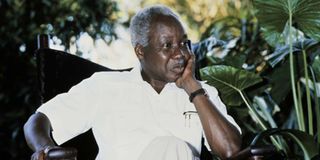Premium
Remembering and recasting Julius Nyerere in 2020

Former Tanzanian President Julius Nyerere in Dar es Salam, Tanzania on January 31, 1985. File | Nation Media Group
What you need to know:
- It is often difficult to speak about Nyerere without praising him.
- The Making of a Philosopher takes the reader back to Nyerere’s childhood, to his village life in Butiama, where he grew up in a polygamous home, under a colonial era father who was a chief.
The Nyerere in The Making of a Philosopher is a feminist who didn’t shout about it but wrote passionately about the need for women to gain skills and knowledge that would make them integrate into the modern society.
In the early days, Nyerere's wife had to rear chickens to pay the bills
Julius Kambarage Nyerere remains standing tall, above the entire cast of African presidents to date. There is hardly his peer who remains as known as Nyerere. Kwame Nkrumah, Jomo Kenyatta or Léo-pold Sédar Senghor come close to him in terms of name recognition, but not necessarily in legacy.
It is often difficult to speak about Nyerere without praising him. Indeed, this latest biography of him, Development as Rebellion: A Biography of Julius Nyerere (Mkuki na Nyota, 2020), edited by Saida Yahya-Othman, Issa Shivji and Ng’wanza Kamata, notes that writing or speaking about Nyerere is not easy without using adjectives that elevate him above others. Yet, as this latest offering shows, Nyere-re was not a saint; he was all too human.
Development as Rebellion comes in three volumes. Volume one is titled The Making of a Philosopher, with the lead author being Saida Yahya-Othman; Becoming Nationalist is by Ng’wanza Kamata; and Re-bellion Without Rebels is done by Issa G. Shivji.
African liberation
Apparently, the authors are working on a fourth volume, which will ‘… cover his intense and leading role in African liberation and unity, as well as his profile as a statesman of the South’. One can only wait to read more about Nyerere’s role as an African statesman.

So, how does one write a review of a volume like this without ‘spoiling the reader’s appetite with in-adequate summaries of the content’, to quote the authors of the biography?
What does one hint at, what does one leave out, what does one summarise, what does one critique?
This is a difficult task, but I can tell the reader that this is one of those books that the reader does not easily put down. It is not a book to put on the shelf and write a mental note to read later.
It is not a book for tomorrow. It is a book for today. Why? Because it is a book that is drafted from so many other books; borrowing from so many interviews with friends, colleagues, family of Nyerere; adapting from so many of Nyerere’s own books, speeches, letters, memos; a book built by literary bricks from so much of Tanzanian historiography that it is in itself a completely new manuscript on the politics, eco-nomics, culture and social life of Tanzania.
Development as Rebellion: The Making of a Philosopher takes the reader back to Nyerere’s childhood, to his village life in Butiama, where he grew up in a polygamous home, under a colonial era father who was a chief. Yet in future life, Nyerere didn’t want anything to do with the chiefs.
Elementary schooling
The volume traces his childhood, elementary schooling, the influence of the Maryknoll sisters, high school in Tabora, time spent at Makerere University and later entry into politics.
At Makerere, Nyerere is said to have written extensively about African women, formatting his philosophy on the place of the African woman in society, as well as beginning to seriously evolve beliefs about the African society.
In carefully crafted, almost conversational style but borrowing from a number of texts that already exist on Nyerere, Saida Yahya-Othman and his co-writers build up a complex image of a family man, a rising and later national/pan-African political figure, a philosopher, a stickler to the rule of law, a man who lived a frugal life, a president who retired to a humble house in his native village to drink tea/coffee with fellow villages, play bao and play the role of an elder among his people.
The authors present Nyerere as he was seen from different perspectives and let the readers make up their own minds.
The Nyerere in The Making of a Philosopher is a feminist who didn’t shout about it but wrote passionately about the need for women to gain skills and knowledge that would make them integrate into the modern society.
The reader meets a man who was so passionate about writing that he had more than 15 book titles to his name, 15 booklets, tens of journal publications, introductions to books etc, to his name. No retired (dead or alive) or active African president can beat this record. Although many people know Nyerere for his translations of two of Shakespeare’s plays, Nyerere is probably the preeminent African presidential philosopher.
It is just too sad that his books cannot easily be found in African bookshops or libraries.
Ordinary man
But the philosopher-king was also an ordinary man. In fact too ordinary considering that he was the founding president of Tanzania.
This is a man who welcomed his family and friends to his home – State House, played bao with his friends, drunk a beer and smoked a cigarette with acquaintances and was a prolific letter writer engaging in long-term communication with specific individuals that were close to him, according to the biographers.
The writers reveal how Nyerere lived a life that he thought fellow Tanzanians lived. His children mostly went to public schools. They had to struggle like the rest of the citizens to look for work.
Even when they had work, they lived by the law of the land. There is an anecdote of his two sons, working in the Tanzanian Air Force, being dragged from State House and caned by the military police for being away from work without permission.
In the early days, his wife had to rear chickens to pay the bills. Nyerere would share the royalties from his publishers with TANU, for instance, and only keep a percentage.
If you wish to know how Nyerere lived with his wife, you will find it in The Making of a Philosopher. Yes, he had fights with his wife, but the marriage endured. He was rumored to have had flings. But as a handsome man and a good talker, he was said to be a good charmer.
The details are in the book. But he had a longstanding relationship with one woman, his personal assistant, Joan Wicken – a relation-ship that would undoubtedly have been seen by some as more than just an administrative one.
Intellectual work
Theirs was what the authors call a ‘meeting of minds.’ Wicken served Nyerere for more than 30 years as the ‘personal assistant to the president’, ‘personal assistant to the chairman’, and ‘personal assistant to the chairman of the South Commission’. She resigned from the South Commission when Nyerere died in October 1999.
In her work, she definitely influenced Nyerere and played a significant role in his intellectual work, writing, editing and preparing some of his speeches and books for publication. Either of them shunned ostentation. She loved books just the way he did. And she retired on state pension, pretty much as he did. In a sense, the Nyerere and Wicken in The Making of a Philosopher are the model public servants that one wishes African governments could have today.
To date visitors to Nyerere’s ancestral home marvel at how an African president could have ‘abandoned’ his home or community the way Nyerere did. By this they imply that Nyerere should have appropriated state resources to build a highway to his village, constructed a mansion, erected monuments to celebrate himself and appointed his village men and women into government offices.
Sadly for them, they don’t reckon with the fact that indeed Nyerere was a philosopher-king; he sought to serve Tanzanians, Africans and humanity first. Thus he did not have time to accumulate money and property for himself. No wonder that after his presidency he didn’t approve of the direction that his beloved party CCM was taking.
Next week, we will examine the second book in the series, Becoming Nationalist to understand how Nyerere thought about building the nation-state of Tanzania from its disparate ethnic communities, races, religious/spiritual communities and languages.
The writer teaches literature at the University of Nairobi. [email protected]





